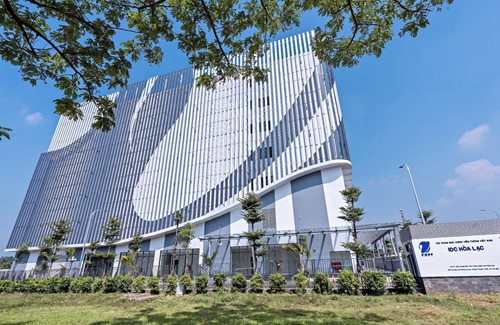Over the past two decades, Vietnam has evolved from a developing country with limited technical infrastructure into one of the leading nations in Southeast Asia for digital infrastructure development. Significant achievements in internet connectivity, telecommunications, and the application of new technologies have laid a solid foundation for the country's digital transformation.
Telecommunications and broadband infrastructure are among key areas receiving strong investment in Vietnam. As of the end of 2023, Vietnam's fixed broadband network had achieved an average speed of 104.08 Mbps, a 31.9% increase compared to 2022, surpassing the global average of 87.79 Mbps. Vietnam currently ranks 41st in the world in terms of fixed broadband speed, outperforming many developed economies.
    |
 |
|
The IDC Data Center at Hoa Lac High-Tech Park |
Particularly, Vietnam’s mobile broadband network has reached a speed of 44.92 Mbps, ranking fourth in Southeast Asia, following Singapore, Malaysia, and Brunei. Despite being a developing country, Vietnam's 4G mobile broadband coverage has hit 99.8% in 2023, higher than many high-income developed countries (99.4%). The 5G network has also been deployed in the central areas of all 63 provinces and cities.
Currently, 100% of Government agencies have implemented specialised data transmission networks down to the commune level for data exchange and sharing. All ministries, sectors, and localities have built and upgraded administrative procedure portals. A total of 82.2% of households use fibre-optic broadband, while over 84% of mobile users own smartphones, higher than the global average of 63%. Fiber-optic cable has reached nearly 80% of households, exceeding the global average of 60%. As of December 2023, the percentage of IPv6 usage in Vietnam’s internet network reached 59%, ranking second in Southeast Asia and ninth globally. Furthermore, the cost of internet services in Vietnam remains low, half of the global average, making it more accessible to both citizens and businesses.
Data center infrastructure is another critical element of Vietnam's digital infrastructure strategy. The country has 9 companies providing data center services, with 43 data centers nationwide and a total of 571,000 servers. These centers have not only supported data storage and processing but also enable advanced technologies such as artificial intelligence (AI), the Internet of Things (IoT), and big data. Ministries, sectors, and localities all have their own data storage infrastructure to support the development of platforms and data, with some areas implementing cloud computing technology to enhance capacity. As of now, 71.43% of ministries, sectors, and localities have set up data centres to support digital transformation, utilizing cloud computing technology.
The establishment of digital community technology groups nationwide is another significant milestone. As of the end of 2023, over 80,000 such groups had been formed in all 63 provinces and cities, with more than 378,000 members. This initiative helps bridge the digital divide among regions across the country.
Meeting demands amid data booming
Digital infrastructure development is one of the three main pillars of the National Digital Transformation Program to 2025 with a vision to 2030. The Government aims to build a synchronized, modern digital infrastructure system that meets the needs of the data booming period while ensuring cybersecurity and enhancing national competitiveness.
Currently, Vietnam is focusing on expanding and upgrading broadband infrastructure nationwide, prioritizing investment in key areas such as large cities, high-tech zones, industrial zones, and Government agencies. The Government is also pushing the construction of four to six additional international submarine cables to enhance global connectivity, positioning Vietnam as a regional data hub.
Regarding the construction of national data centers, Vietnam plans to establish at least three centers meeting international standards to serve State management and provide online public services. These centers will play a foundational role in data storage and processing while boosting the big data industry.
In terms of promoting IoT and new technologies, IoT infrastructure will be integrated into essential sectors such as transportation, energy, and smart cities. Additionally, AI applications for management and operations will be encouraged to optimize the operational efficiency of organizations and businesses.
To drive digital transformation, the Government plans to train 500,000 high-skilled IT professionals by 2025. Digital skills training programs will be widely deployed through massive open online courses (MOOCs), helping millions access digital knowledge. In parallel, specialised courses will enhance the capabilities of civil servants and business employees.
On the policy front, the Government has created incentives to attract investments into digital infrastructure, ranging from tax breaks to financial support. Furthermore, Vietnam is actively collaborating with other countries and international organizations to gain knowledge, transfer technology, and promote innovation.
Source: VNA